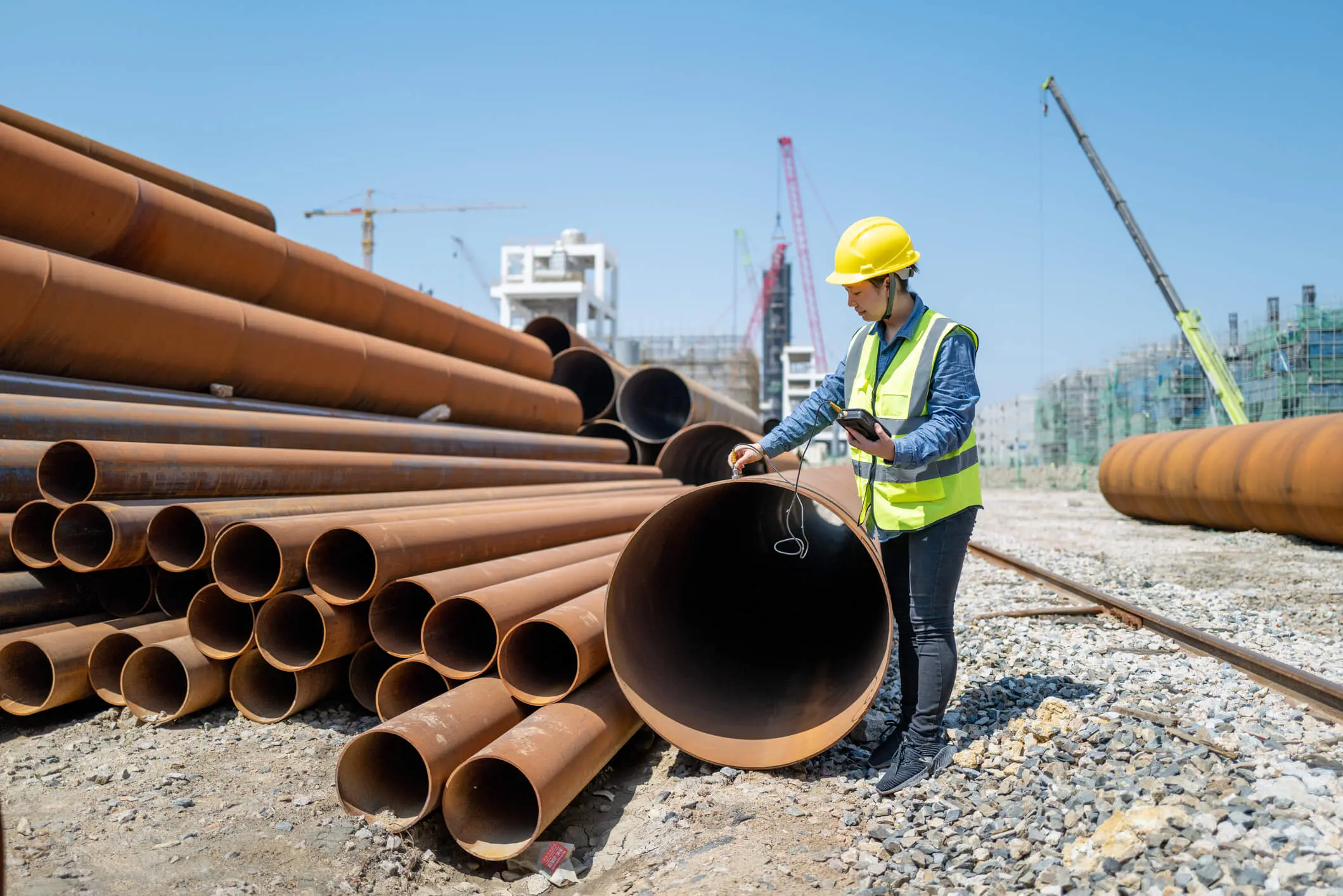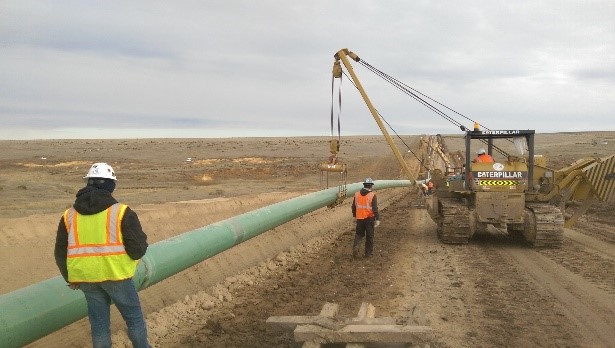How Creek Pipe Midland Applies Data Analytics to Prevent System Failures
Wiki Article
A Comprehensive Guide to Comprehending Pipelines and Their Duty in Building
Pipelines are important components in construction, serving vital features in waste, gas, and water monitoring. Their selection and application can substantially affect a building's efficiency and security. Various products, such as PVC, copper, and PEX, supply distinctive advantages fit to particular needs (Creek Pipe Pipeline Construction). Comprehending these aspects is vital for any building and construction job. As one checks out the complexities of pipelines, the ramifications for conformity and public health and wellness ended up being increasingly noticeableThe Relevance of Piping in Construction
Pipelines act as vital conduits in building and construction, promoting the activity of water, gas, and waste throughout structures and framework. Their function expands beyond mere transport; they are crucial for ensuring the functionality and security of residential and business environments. Appropriately mounted pipes add to the efficient distribution of sources, enabling daily tasks such as home heating, showering, and cooking. Additionally, pipelines play a crucial role in waste administration, making certain that sewer and wastewater are effectively eliminated from living spaces.The value of pipelines is additionally reflected in their impact on public health and wellness. Poor or defective piping systems can cause contamination and dangerous conditions, making top quality materials and installation methods essential. Additionally, pipes must follow various building codes and regulations, which are designed to protect both occupants and the setting. The significance of pipelines in building encompasses both practical capability and crucial health and wellness considerations.Sorts Of Water Lines Utilized in Structure Jobs
Various kinds of pipes play a significant duty in building tasks, each created to meet specific requirements and applications. Among one of the most typically used pipeline types are PVC, which is immune and lightweight to deterioration, making it optimal for drainage and air vent systems. CPVC pipes, comparable to PVC, can withstand greater temperatures, usually used in warm water systems. Copper pipes are recognized for their toughness and dependability, regularly used in plumbing and home heating applications. Galvanized steel pipelines, while less common today, were when a standard for water supply lines due to their toughness. Furthermore, PEX (cross-linked polyethylene) pipes are gaining appeal for residential pipes due to their versatility and resistance to scaling and chlorine. Lastly, cast iron pipes are preferred for their sound-dampening residential properties, typically utilized in waste and dirt systems. Each pipeline kind offers distinct functions, guaranteeing reliable procedure in construction projects.Typical Materials for Water Lines and Their Properties
In construction, the option of pipe products is essential for ensuring toughness and capability. Steel pipelines offer strength and resistance to high pressures, while plastic pipes supply corrosion-resistant and light-weight choices. Compound pipelines integrate the advantages of both materials, making them flexible choices for different applications.Metal Pipe Options
Metal pipes are integral components in construction, offering a range of options that satisfy different applications and ecological problems. The most common products consist of steel, copper, and cast iron. Steel pipelines are understood for their strength and longevity, making them suitable for high-pressure applications. Copper pipelines are favored for their rust resistance and antimicrobial residential properties, frequently used in plumbing systems. Cast iron pipelines give excellent audio insulation and are perfect for waste and drain systems. Each steel type has distinctive benefits; as an example, galvanized steel can resist corrosion, while stainless-steel provides superior deterioration resistance. Choosing the suitable steel pipe depends on variables such as expense, environmental direct exposure, and the particular needs of the building project.
Plastic Pipe Advantages
Plastic pipes have actually acquired appeal in construction because of their light-weight nature and flexibility. These pipelines, made from products such as PVC, CPVC, and PE, offer exceptional resistance to deterioration and chemical damage, making them appropriate for numerous applications. Their ease of setup more enhances their charm, as they can be reduced and signed up with without special tools. Furthermore, plastic pipelines are generally much more cost-efficient compared to metal choices, adding to reduced total project costs. Their smooth interior surface areas lower friction and improve flow prices, while insulation properties assist preserve temperature level control in pipes systems - Creek Pipe Company. With a variety of sizes and setups available, plastic pipelines effectively fulfill the diverse demands of contemporary construction jobsComposite Pipe Characteristics
Compound pipes incorporate various materials to leverage their individual strengths, resulting in enhanced performance and toughness. Commonly, these pipelines include layers that might include plastics, porcelains, and steels, each adding special properties. For example, the internal layer may be made from a corrosion-resistant material, while the external layer supplies strength and impact resistance. This mix enables composite pipes to hold up against severe temperatures and stress, making them appropriate for a broad range of applications, consisting of water system and industrial procedures. Furthermore, composite pipes are usually lighter than standard materials, facilitating much easier handling and setup. Their versatility and versatility to different settings learn this here now make them a favored selection in contemporary building and construction jobs, ensuring long life and efficiency in liquid transport systems.Applications of Piping in Pipes Equipments
website here
Electric Conduits: The Function of Pipes in Electrical wiring
In modern building and construction, electrical channels play an essential function in making certain the reliable and secure routing of electrical wiring throughout buildings. These pipes offer a safety path for electric cords, protecting them from physical damage and ecological variables. Numerous materials, such as PVC, steel, and flexible channels, are used relying on the details needs of the installation.Furthermore, conduits help in organizing electrical wiring systems, lowering the threat of electric hazards like short circuits or fires. They also facilitate simpler maintenance and upgrades, as cables can be accessed and replaced without considerable interruption to the structure.Proper setup of electrical channels is important for compliance with building ordinance and safety policies. This structured approach not only improves the durability of the electrical system but also adds to the total safety and security and capability of the structure, making electrical conduits vital in modern construction practices.Picking the Right Pipeline for Your Job
How can one guarantee the appropriate pipeline choice for a construction project? The option procedure begins with understanding the details demands of the job, including the kind of fluids being transferred, stress scores, and environmental problems. Material options, such as Steel, click here for info copper, and pvc, need to be assessed based on toughness, corrosion resistance, and thermal properties.Next, one should think about the pipe's size and flow ability to establish effective procedure. Regulatory standards and codes should also be abided by, as they dictate the appropriate materials and techniques for particular applications. Consulting with professionals and using extensive sources can further assist in making informed decisions.Finally, reviewing the cost-effectiveness of various alternatives is vital, stabilizing initial costs with lasting maintenance and replacement prices - Creek Pipe Pipeline Construction. By thoroughly assessing these elements, one can with confidence pick the most appropriate pipeline for their construction job, assuring both capability and compliance
Maintenance and Examination of Water Lines in Building
Proper option of pipes establishes the foundation for their lasting performance, making upkeep and assessment vital components in building and construction. Regular upkeep assurances that any kind of prospective issues, such as leakages, deterioration, or obstructions, are identified and resolved quickly, minimizing expensive repairs and job delays. Arranged inspections, including visual analyses and pressure examinations, play a vital duty in assessing the honesty of pipe systems.Additionally, monitoring ecological factors, such as temperature changes and dirt problems, can aid prepare for deterioration. Making use of sophisticated technologies, such as CCTV for interior assessments, can enhance the efficiency of upkeep efforts. It is critical to document inspection findings and maintenance tasks to establish a complete history of the pipeline systems. By prioritizing upkeep and assessment, construction professionals can extend the life-span of their piping systems, guaranteeing they run effectively and dependably throughout the task's duration.Often Asked Inquiries
Exactly How Do Pipes Affect Energy Efficiency in Buildings?
Pipes considerably affect power effectiveness in buildings by regulating heating and cooling systems. Appropriate insulation and materials minimize energy loss, while effective pipes styles lessen water use, inevitably bring about reduced power intake and functional expenses.What Laws Govern Pipe Setup in Building?
Laws regulating pipe installation in construction usually include national and local building regulations, plumbing codes, and safety criteria. These warranty conformity with structural integrity, product requirements, and health and wellness demands, promoting safety and performance in building methods.Can Pipes Be Recycled After Usage?
The question of pipeline recyclability is significant. Many products, such as metal and certain plastics, can be recycled efficiently. However, the problem and sort of pipe influence reusing usefulness, requiring appropriate assessment before disposal.
Just How Do Weather Influence Pipeline Performance?
Climate conditions significantly affect pipeline efficiency. Severe temperature levels can trigger growth or contraction, while wetness might bring about corrosion. Additionally, hefty rainfall can raise soil pressure, influencing security and overall performance of the piping system.What Are the Indications of Pipe Failure to Look For?
Indicators of pipe failing consist of leaks, unusual sounds, staining of water, reduced water pressure, and noticeable corrosion. Regular evaluations can help find these problems early, avoiding costly repair services and making certain system functionality in the lengthy term. Pipes play an essential duty in waste monitoring, making sure that sewage and wastewater are successfully removed from living spaces.The significance of pipes is additionally shown in their influence on public health and wellness. In building and construction, the selection of pipeline materials is important for guaranteeing durability and performance. Steel pipelines offer strength and resistance to high stress, while plastic pipelines provide corrosion-resistant and lightweight choices. Furthermore, pipes are used to remove wastewater, connecting bathrooms, sinks, and drains to metropolitan sewage systems or septic tanks.Different kinds of pipelines, such as PVC, copper, and PEX, are chosen based on factors like sturdiness, price, and certain application demands. How can one guarantee the right pipeline option for a construction task?Report this wiki page